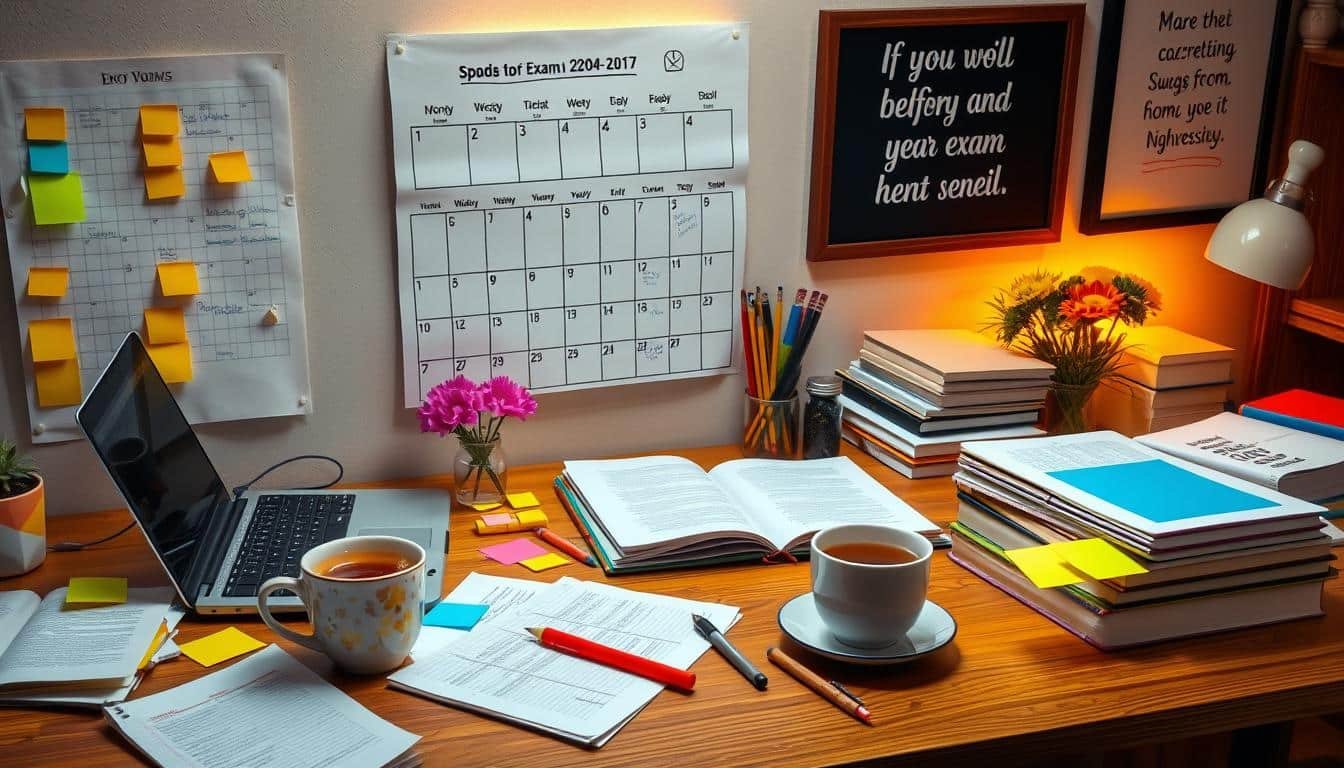Exam Success Tips For Students Getting good grades often comes down to how well you prepare for exams. Students face many challenges when taking tests. But, with the right strategies, they can do much better.
Knowing how you learn best is crucial. Whether you see, hear, or do things to learn, using your preferred method can help you remember more. Also, studying a little bit every day is better than trying to cram all your studying into one night.
Also Read: What Is Digital Privacy Law And Why Is It Important?
Being physically and mentally healthy is also key. Getting enough sleep, eating well, and managing stress can help you stay focused and sharp during exams. By taking care of both your studies and your health, you can do your best.
Key Takeaways
- Develop effective study habits and avoid last-minute cramming
- Identify your learning style and tailor your study methods accordingly
- Prioritize physical and mental well-being through proper rest, nutrition, and stress management
- Leverage available resources and support systems to enhance your exam performance
- Maintain a positive mindset and confidence throughout the exam preparation process
Effective Study Preparation Strategies
Creating a good study schedule is key for exam prep. Break down your work into smaller parts and set aside time for each subject. Studying at the same time every day helps build a routine.
Also Read: What Are The Basics Of Real Estate Law Practices Every Homebuyer Should Know?
Creating an Organized Study Schedule
First, list all your exams and what you need to study. Then, make a study plan with specific times for each subject. Be honest about how much time you can give and don’t overdo it. Make sure to include breaks to avoid getting too tired.
Developing Strong Study Habits
Good studying is more than just reading. Make it a habit to review notes every day, do homework, and take practice tests. Try out different learning techniques like flashcards, mind maps, or listening to lectures.
Understanding Your Learning Style
Knowing your learning style – visual, auditory, or kinesthetic – can improve your study plan. Visual learners do well with diagrams, while auditory learners like listening to lectures. Kinesthetic learners enjoy doing hands-on activities.
There’s no single way to study that works for everyone. Be open to trying different methods to see what works best for you.
Pre-Exam Success Techniques

Getting ready for exams is more than just cramming the night before. Good exam preparation means using many strategies to handle test anxiety and feel more confident. By using these pre-exam tips, you can do well in your exams.
Also Read: How Can You Avoid Traffic Law Violations?
Begin by collecting all your study materials the night before. This includes books, notes, and any other study aids. Don’t try to cram everything in one night. Studies show that spaced repetition and regular self-testing are better ways to study.
Focus on reviewing important concepts and making short summary notes. Try answering sample questions to check your understanding and see where you need to improve. Also, joining study groups can help you test your knowledge and get better.
Make a special pre-exam routine to help you feel more confident and calm. This could be listening to soothing music, doing deep breathing exercises, or light exercise. A clean and quiet study space also helps you remember things better.
By using these pre-exam success techniques, you’ll be on the path to reaching your academic goals and handling test stress well.
Exam Success Tips For Students
Getting good grades in exams takes more than just studying. It’s about planning and doing well on the test. Here are some tips to help you do your best and reach your goals.
Time Management During Tests
Managing your time well is key during exams. Start by looking over the whole test to know what to expect. Do the easy questions first to get going and feel more confident. Then, move on to the harder ones.
Keep an eye on the clock to make sure you have enough time. This way, you can finish everything you need to.
Strategic Question Approach
When you get a question, read it carefully and underline important words. Break down hard problems into smaller steps. If you’re unsure, ask the teacher for help.
Remember, you’re showing what you know. So, give clear and well-thought-out answers.
Answer Review Methods
If you have time, check your answers before you turn in the exam. Look for any mistakes and make sure you’ve answered every question. Double-checking your work can really help your score.
Also Read: Why Do You Need A Military Law Attorney?
Using these test-taking strategies can improve your exam performance. Stay focused, manage your time well, and think carefully about each question. This will help you succeed in school.
Physical and Mental Preparation Tips

Doing well on exams isn’t just about being smart. It also depends on your physical and mental health. When exam stress hits, taking care of yourself is key to staying sharp.
Sleep and Rest Requirements
Getting enough sleep is vital for your brain and memory. Try to sleep 7-9 hours each night before the exam. Don’t try to stay up all night, as it can make you tired and unfocused.
Nutrition and Hydration Guidelines
Eat a diet full of foods that help your brain. Include lots of fruits, veggies, proteins, and carbs to keep your energy up. Drinking water is also important to stay sharp mentally.
Stress Management Techniques
Dealing with stress is normal, but it’s important to handle it well. Try yoga or meditation to calm down. Also, cut back on caffeine and make time for fun activities to keep your mental health in check.
Also Read: What Are Consumer Protection Laws And Why Are They Important?
By focusing on your health during exam prep, you’ll do better and feel less stressed. A balanced approach to self-care is the secret to success.
Maximizing Classroom and Study Resources

As a student, you have access to many academic resources and chances to learn together. Using these resources well can make your studying better and improve your grades.
First, be an active part of your classes. Go to all lectures, engage with the material, and take detailed notes. This helps you understand and remember what’s taught. Also, joining study groups with classmates can be helpful. You can review ideas, talk about hard topics, and test each other.
Don’t miss out on your professors’ office hours. They can give you insights that help your learning. Use online tools, textbooks, and practice exams to deepen your knowledge.
- Attend all lectures and actively engage with the material
- Form study groups with classmates to collaborate and review concepts
- Utilize office hours to seek guidance and clarification from professors
- Explore online resources, textbooks, and practice exams to enhance your learning
By making the most of academic resources and learning together, you can develop a strong study plan. This plan will help you prepare for exams and improve your grades.
Long-term Success Strategies
Using effective study habits like spaced repetition and active recall can really help. Make sure to take regular breaks and use the Pomodoro Technique to stay focused. The Feynman Technique can also help you understand complex topics better. Plus, teaching others what you’ve learned can really help you remember it yourself.
Building Confidence for Future Exams
Look back on your past successes with pride. Use them as a base to set goals for the future. Always keep a growth mindset and look for ways to improve. With each exam, you’ll get better and more confident.
“The secret of getting ahead is getting started. The secret of getting started is breaking your complex overwhelming tasks into small manageable tasks, and then starting on the first one.” – Mark Twain
Remember, success in school is a long-term effort. By focusing on long-term goals and always improving, you’ll set yourself up for success. This will make your educational journey rewarding and fulfilling.
“Effective learning is not about the quantity of time spent studying, but the quality of the learning strategies used.”
Also Read: Best Exam Scoring Techniques For Guaranteed Success
Conclusion
Starting your academic journey means you’re on a path of growth and learning. Every exam is a chance to get better at studying, learn more, and build important skills. These skills are key for academic success and lifelong learning.
Using the study tips and strategies from this article can help you do well in school. Take care of your body and mind, use all the resources you can, and keep a balanced view of your education.
Your success in exams is just part of your journey. Stay focused, tackle challenges head-on, and keep growing. With hard work and a drive to always improve, you can reach your full potential. This will lead to lasting academic success and lifelong learning.
FAQ
Q: What are some effective tips to help reduce stress during final exams?
A: Some effective tips to help reduce stress during final exams include creating a study schedule, practicing relaxation techniques, and ensuring you get enough sleep. Additionally, incorporating regular breaks into your study sessions can help you stay focused and reduce anxiety.
Q: How can I prepare for my exams effectively?
A: To prepare for your exams effectively, start by reviewing the syllabus and class notes to identify important information. Break your study time into manageable sessions, utilize study groups, and practice past exam questions. These strategies can help you stay on track and feel more confident on exam day.
Q: Is it beneficial to take breaks while studying for exams?
A: Yes, taking breaks while studying for exams is highly beneficial. Short breaks can help refresh your mind, prevent burnout, and keep you motivated throughout your study time. Techniques like the Pomodoro technique, which involves studying for 25 minutes and then taking a 5-minute break, can be particularly effective.
Q: How can I stay motivated during exam preparation?
A: To stay motivated during exam preparation, set specific goals for each study session, reward yourself for completing tasks, and surround yourself with supportive peers. Additionally, maintaining a positive mindset and reminding yourself of the benefits of doing well on your exams can help keep you motivated.
Q: What are some study tips that can help increase my grade point average?
A: Some study tips that can help increase your grade point average include maintaining a consistent study schedule, actively engaging with the material, and utilizing various study methods such as flashcards, summarizing notes, and teaching the material to others. These techniques can enhance your understanding and retention of information.
Q: How should I manage my time to study effectively for final exams?
A: To manage your time effectively for final exams, create a study plan that allocates specific time blocks for each subject based on the syllabus and your comfort level with the material. Prioritize your study sessions by focusing on tougher subjects first and leave ample time for review before the exam day.
Q: What should I eat to help reduce stress and increase my focus during exam time?
A: To help reduce stress and increase focus during exam time, opt for nutritious foods such as fruits, vegetables, whole grains, and lean proteins. Avoid junk food, as it can lead to energy crashes and decreased concentration. Staying hydrated is also crucial for maintaining focus.
Q: How can attending office hours benefit my exam preparation?
A: Attending office hours can benefit your exam preparation by providing you with the opportunity to clarify any doubts with your instructors, gain deeper insights into the material, and receive guidance on study techniques. This one-on-one interaction can significantly enhance your understanding and performance on the exam.
Q: Can multitasking be effective when studying for exams?
A: Multitasking is generally not recommended when studying for exams, as it can reduce the quality of your study sessions and hinder your ability to retain important information. Instead, focus on one task at a time to maximize concentration and efficiency.
Q: What should I remember as I head into exam day?
A: As you head into exam day, remember to stay calm, review your notes lightly, and ensure you have all necessary materials ready (like pens, ID, and any allowed resources). Arrive early to the exam location to avoid last-minute stress and take deep breaths to help reduce anxiety before the exam begins.
Source Links
- https://summer.harvard.edu/blog/14-tips-for-test-taking-success/
- https://shorelight.com/student-stories/21-best-study-tips-for-final-exams/
- https://www.northwestcareercollege.edu/blog/exam-success-10-tips-to-help-you-ace-your-exams/
- https://www.latrobe.edu.au/students/study-resources/learning/achieve/exam-prep
- https://goingmerry.com/blog/study-tips-for-college/
- https://www.vu.edu.au/about-vu/news-events/study-space/10-tips-on-how-to-study-effectively
- https://www.uottawa.ca/current-students/news-all/17-tips-exam-success
- https://www.uwa.edu.au/seek-wisdom/seekers-space/study/study-tips/2023/09/7-exam-tips-to-help-you-succeed
- https://usq.pressbooks.pub/academicsuccess/chapter/exams-and-alternative-assessments/
- https://www.ulster.ac.uk/student/wegotthis/blog/10-tips-for-exam-success
- https://www.york.ac.uk/students/news/2024/study-exam-tips-semester-2/
- https://www.concordia.ca/cunews/main/stories/exams/essential-tips-for-exam-success.html
- https://jedfoundation.org/resource/6-ways-to-take-care-of-yourself-during-exam-time/
- https://www.nhs.uk/mental-health/children-and-young-adults/help-for-teenagers-young-adults-and-students/tips-on-preparing-for-exams/
- https://www.vettechprep.com/study-tips.jsp
- https://learningcenter.unc.edu/tips-and-tools/studying-101-study-smarter-not-harder/
- https://opportunity.org/learn/lists/10-habits-of-successful-students
- https://www.usa.edu/blog/study-techniques/
- https://www.dcc.edu/blog/final-exam-success.aspx
- https://www.student.com/articles/10-tips-efficiently-prepare-exam
- https://www.uwec.edu/offices-services/student-success-center/academic-skills-center/resources-tips-and-tools-students-0
- https://learningcenter.unc.edu/tips-and-tools/strategic-test-prep/
- https://lsc.cornell.edu/how-to-study/studying-for-and-taking-exams/effective-study-strategies/
- https://platinumvalleyschool.com/blog/effective-study-tips-for-students-how-to-ace-your-exams/
- https://www.student.com/articles/exam-success-strategies-a-guide
- https://blog.worldcampus.psu.edu/exam-success-strategies-tips-for-testing-with-confidence/
- https://www.uottawa.ca/campus-life/news-all/17-tips-exam-success
- https://www.pointloma.edu/resources/undergraduate-studies/10-study-tips-surviving-finals-week
- https://www.princetonreview.com/college-advice/how-to-study-for-a-test
- https://www.aboms.org/news/managing-stress-while-studying-and-taking-board-certification-exams
- https://www.tuitionrewards.com/newsroom/articles/394/three-practical-mental-health-tips-for-exam-season
- https://lpsonline.sas.upenn.edu/features/7-tips-help-you-achieve-academic-success
- https://www.cgs.pitt.edu/why-cgs/mccarl-center/academic-success-resources/active-study-strategies
- https://www.daniel-wong.com/2023/01/10/study-strategies/
- https://www.examtesting.com/blogdetails.aspx?id=50549
- https://www.wikihow.com/Pass-Final-Exams
- https://www.cuesta.edu/student/resources/ssc/study_guides/mathematics/211_math_steps.html





